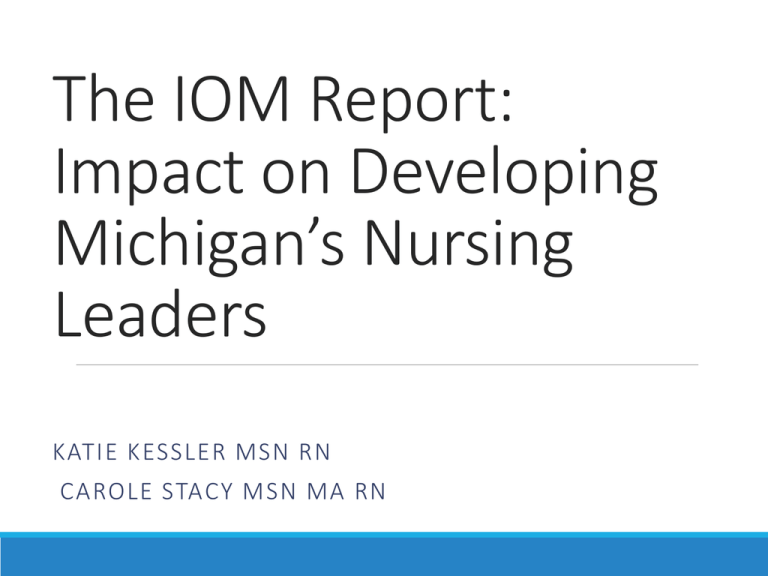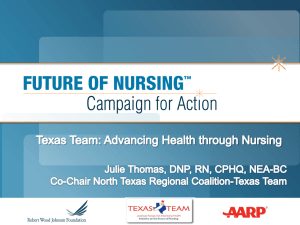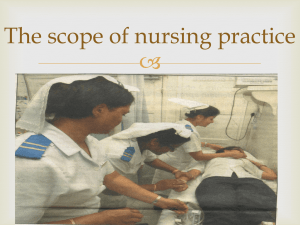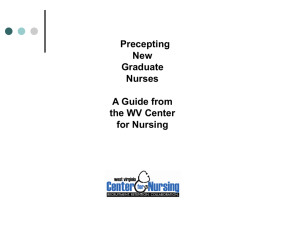Kessler and Stacy - IOM report Michigan Nursing
advertisement

The IOM Report: Impact on Developing Michigan’s Nursing Leaders KATIE KESSLER MSN RN CAROLE STACY MSN MA RN The IOM Report on The Future of Nursing: Leading Change: Advancing Health The IOM Report “Nurses are committed to improving the care they deliver by responding to health care challenges. If their full potential is to be realized, however, the nursing profession itself will have to undergo a fundamental transformation in the areas of practice, education, and leadership.” IOM Report Recommendation #1 Nurses should practice to the full extent of their education and training Nurses have potential to lead innovative strategies to improve the healthcare system What are the barriers? Scope of practice regulations High turnover rates of new graduate nurses IOM Report Recommendation #2 Nurses should achieve higher levels of education and training through an improved education system that promotes seamless academic progression Major changes in healthcare systems and practice require equally profound changes in nursing education What are the barriers? Multiple educational pathways leading to entry level practice IOM Report Recommendation #3 Nurses should be full partners with physicians and other health professionals, in redesigning health care in the United States Strong leadership is critical if the vision of a transformed healthcare system is to be realized Nurse leaders must be in place from bedside to boardroom Leadership is fundamental to advancing the profession Development of leadership skills is needed for all nurses and for nursing students IOM Report Recommendation #4 Effective Workforce Planning & Policy Making Require Better Data Collection and an Improved Information Infrastructure Accurate data is needed for future workforce projections and for planning Data and information gathered must be timely and publicly accessible. What are the Barriers? Inadequate demand data Campaign for Action Vision All Americans have access to high-quality patient-family-and community based care in a health system in which nurses contribute as essential partners in achieving success. Areas of Focus Leadership Practice and Care Education Interprofessional Collaboration Diversity Campaign for Action Dashboard Indicators Campaignforaction.org/dashboard Progress: Education Academic Progression in Nursing Nine states piloting promising models: MA, NY,HI,CA. WA,NC,NM,MT, and TX ◦ Shared statewide or regional curricula ◦ Shared framework for competency based education ◦ Offering BSN at Community College ◦ RN-MSN degree completion programs Progress: Education Medicare providing funds for Graduate Nurse Education in five states RWJF launches Future of Nursing Scholars program for PhD study Michigan Initiatives Health Systems requiring nurses to earn BSN within a specified timeframe Munson Healthcare Metro Health Hospital Incentives for nurses Increased tuition reimbursement benefits Educational program options Michigan Initiatives Michigan State University Concurrent Enrollment Program Partnership with Lansing Community College and Macomb Community College Saginaw Valley State University Program Partnership with Delta College and Kirtland Community College Progress: Practice and Care 14 states introduced legislation expanding scope of practice for nurse practitioners NV, OR and NE passed legislation Other states still have legislation in play Six states have removed major barriers to APRN practice and care Progress: Leadership North Carolina, Wyoming, Michigan and California: Nursing Leadership Institutes Virginia: 40 under 40 awards Leapfrog group: Nurses need to be integrated into governance for hospital to attain Magnet Goal: 25 nurses on priority national and federal boards; 22 now serve. Michigan Initiatives Michigan Center for Nursing Institute for Nursing Excellence Leading Toward Tomorrow Program Health System Leadership Initiatives Formal initiatives: succession planning Progress: Interprofessional Education HRSA’s Center for IPE and Collaborative Practice Michigan: E2P, West Michigan Interprofessional Education Initiative Progress: Diversity All SIP grant states have a plan for diversity Goal: half of all Action Coalition states will have a diversity plan by year end (2013) Core elements of a diversity plan are: scholarships, increasing enrollments and offering mentoring to minority students. Michigan’s Diversity Council met August 2013 Progress: Data Michigan has 10 years of supply data Survey of APRN workforce (2011 and 2013) 2013 data available September 2013 Michigan Initiatives Annual Survey of Nurses since 2004 State Implementation Program How it works Up to 10 ACs to receive up to $150,000 over two years to implement two priority IOM recommendations Requires match of at least $75,000 Michigan State Implementation Program (SIP) Matching funders ◦ State of Michigan Workforce Development Agency ◦ Blue Cross Blue Shield of Michigan Foundation ◦ The Community Foundation of Southeast Michigan Additional funding At the end of two years: ACs supported in the first phase that have met or exceeded benchmarks and have a plan for further work may have the opportunity to apply for a second round of funding Michigan SIP Priorities Nurses should achieve higher levels of education and training through an improved educational system that promotes seamless academic progression. Nurses should be full partners, with physicians and other health professionals, in redesigning health care in the United States. Educational Advancement Plan: •Collaborate with Nurses and employers to facilitate Educational Advancement •Personalized Career Planning •Develop The ENCORE Website Leadership Plan Develop content on Interprofessional teamwork for the Leading Toward Tomorrow (LTT) program Include other disciplines in the LTT program Develop an Interprofessional section on the ENCORE website Diversity Develop a Michigan Nursing Diversity Council as part of AC Develop a Diversity section within the ENCORE web portal Contacts Katie Kessler MSN RN – Project Manager Katie.Kessler@mhc.org Carole Stacy MSN MA RN – Project Director cstacy@mhc.org











